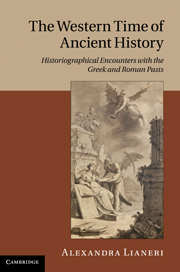Book contents
- Frontmatter
- Contents
- Acknowledgements
- Notes on contributors
- INTRODUCTION
- THEORISING WESTERN TIME: CONCEPTS AND MODELS
- 1 Time's authority
- 2 Exemplarity and anti-exemplarity in early modern Europe
- 3 Greek philosophy and Western history: A philosophy-centred temporality
- 4 Historiography and political theology: Momigliano and the end of history
- ANCIENT HISTORY AND MODERN TEMPORALITIES
- UNFOUNDING TIME IN AND THROUGH ANCIENT HISTORICAL THOUGHT
- AFTERWORD
- Bibliography
- Index
4 - Historiography and political theology: Momigliano and the end of history
from THEORISING WESTERN TIME: CONCEPTS AND MODELS
Published online by Cambridge University Press: 03 May 2011
- Frontmatter
- Contents
- Acknowledgements
- Notes on contributors
- INTRODUCTION
- THEORISING WESTERN TIME: CONCEPTS AND MODELS
- 1 Time's authority
- 2 Exemplarity and anti-exemplarity in early modern Europe
- 3 Greek philosophy and Western history: A philosophy-centred temporality
- 4 Historiography and political theology: Momigliano and the end of history
- ANCIENT HISTORY AND MODERN TEMPORALITIES
- UNFOUNDING TIME IN AND THROUGH ANCIENT HISTORICAL THOUGHT
- AFTERWORD
- Bibliography
- Index
Summary
Exodus may seem in principle simpler than messianism. It has often been opposed to messianism. But as is already evident from the work of Jewish medieval commentators, there is no less difficulty with the ideal of exodus than with that of the utopia at the end of the world. Yet there is a difference: apocalypse may be left to the responsibility of God, while, as Moses understood, exodus is the responsibility of heads of state, even if they are prophets.
Arnaldo Momigliano, Pagine EbraicheIn a typical aside in Alien Wisdom: The Limits of Hellenization, Arnaldo Momigliano provocatively links the historiography of the ancient and the recent past. After describing the Stoic philosopher and historian Posidonius' uncovering of ‘mystical postures and bogus oracles among the supporters of the slave king Eunus and the barbarous Mithridates’, he observes ironically that this ancient view lends ‘some support to that candid Italian scholar of unimpeachable erudition, Aurelio Peretti, who, in the year 1942, tried to persuade himself (and if possible his readers) that no man of Indo-Germanic blood could have protested against Rome: only Jews and other Orientals scribbled sibylline oracles against the ruling power’. The historiography of first- and second-century bce Greek supporters of Roman rule is linked to fascist historiography of the early 1940s by identifying the shared assumption that uttering oracles against Roman dominion was the prerogative of slaves, barbarians, Jews and Orientals.
- Type
- Chapter
- Information
- The Western Time of Ancient HistoryHistoriographical Encounters with the Greek and Roman Pasts, pp. 99 - 116Publisher: Cambridge University PressPrint publication year: 2011

